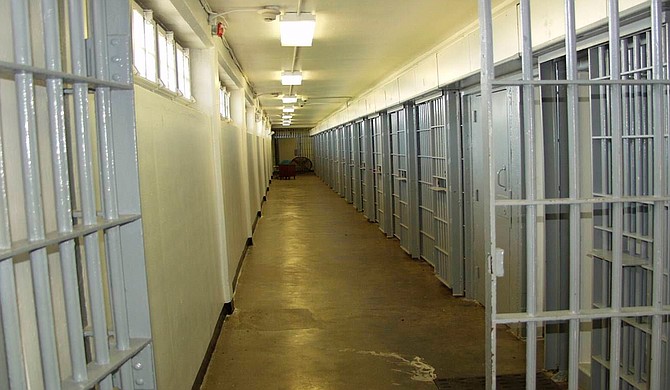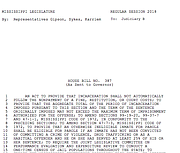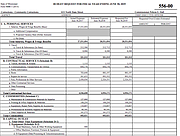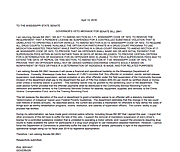Starting July 1, more Mississippians behind bars will be eligible for parole after the Mississippi Legislature passed House Bill 387 and the governor approved it. Photo by MDOC
JACKSON — Criminal-justice reform is and has been a bipartisan issue in the Mississippi Legislature in recent years, and 2018 is no exception. Lawmakers unanimously passed House Bill 387, which had the support of conservative and progressive local and national organizations from Americans for Prosperity to the Southern Poverty Law Center.
The legislation stops the State from running what is, in essence, a debtors' prison for Mississippians who cannot afford their fines and court fees. Judges must determine a defendant's indigence before sending him or her to prison for nonpayment of fines and fees. If a defendant's income is at or below 125 percent of the federal poverty guidelines, the judge must allow the person more time to pay, reduce the amount needed to pay the fines, or allow community service instead of fines.
A single person making $15,175 or less a year would be considered indigent under the new law, which goes into effect July 1. A defendant in a household of four that makes less than $31,375 annually would be considered indigent.
Zoe Towns is the senior director of criminal justice reform at Fwd.us, a bipartisan advocacy organization that follows immigration and criminal justice. She pointed to other lawsuits, including in municipalities in Mississippi where this practice has been deemed unconstitutional.
"(HB 387 is) trying to make sure that the law does not allow the practice of debtors' prisons," Towns told the Jackson Free Press. "Fees and fines and other criminal-justice payments are resulting too often in being pulled back in jail."
No More Stacking
Part of House Bill 387 ensures that the massive criminal-justice reform package the Legislature passed in 2014 has the impact it was intended to have. One part of the new law will prevent judges from stacking technical violations when a person violates the terms of probation or parole. This clarification will ensure that instead of a judge sending someone back to prison or revoking parole entirely on the first technical violation, he or she will go to a technical violation center instead.
Towns said this stacking issue came, in part, from a lack of clarity from the 2014 law.
"We expect that (change) to have a broad impact since there are such high numbers of these revocations," she said.
State Public Defender Andre de Gruy, who serves on the state's re-entry council, estimates that if judges adhere to this change, it could mean a savings of between $12 million to $20 million for MDOC. The logical outcome of this reform would mean fewer Mississippians getting parole or probation revoked and more of them going to a technical violation center for 90 to 180 days as state law allows. MDOC already plans to expand its technical violation center operations this spring, re-opening the Delta Correctional Center in Leflore County as a new 300-bed TVC.
The new reform law also loosens parole eligibility for nonviolent offenders who received enhanced sentences before 2014 (when House Bill 585 passed).
De Gruy estimates that about 177 people will eventually become parole-eligible under this new law, more than 140 of them on July 1. He provided numbers showing that MDOC could save $1.1 million in fiscal-year 2019.
One Passed, Another Vetoed
While Gov. Phil Bryant signed the new reform law with advocates and a bipartisan coalition of lawmakers surrounding him, he quietly vetoed another reform effort. Senate Bill 2841 contained a handful of other reforms, including language to allow those in prison to keep their drivers licenses and drug courts to administer opioid drug treatment.
Bryant said he vetoed the bill primarily because a provision would have required MDOC to determine whether an inmate is indigent before making him or her pay parole, probation or supervision fees. Current Mississippi law requires an inmate to pay a monthly $55 fee when he or she is paroled or on probation or supervision 30 days after their release.
When Bryant vetoed the bill, he said MDOC risked losing "millions" of dollars due to the fact that certain inmates paying supervision fees could be deemed indigent. These fees will total an estimated $13.5 million, or about a third of MDOC's community corrections budget, in fiscal-year 2019, legislative budget office documents show.
MDOC estimates it would have lost as much as 75 percent in supervision fee collections in fiscal-year 2019 if SB 2841 became law. This means in the upcoming fiscal year MDOC could collect as much as $10 million in supervision fees from inmates that the legislation would have deemed unable to pay in the first place because they cannot afford it.
SB 2841 would have allowed inmates to be out from behind bars for 90 days before paying their first $55 fee. The bill also would have guaranteed that an inmate deemed indigent did not have parole or probation revoked because they could not pay the fee. While the reform law Bryant signed allows judges to determine whether or not someone can pay a court fine or fee, it does not cover parole or probation fees collected by MDOC in its language.
Vetoing SB 2841 will continue a scenario that can go like this: If formerly imprisoned people have appointments with their probation officers, but they do not have their probation fees, they can either show up and risk a violation for nonpayment, or they do not show up because they do not have the money and get a violation for not showing up.
"It really cannot be overstated how mentally and emotionally draining it would be going to your appointment every month knowing that they could revoke your probation or parole that day," criminal-justice advocate Blake Feldman said. "... It really becomes a shakedown with so much on the line."
Rep. Joel Bomgar, R-Madison, who advocated for and supported both criminal justice reform measures during the session, said SB 2841 would have helped improve employability in the state.
"This bill would have helped increase employment prospects for those reentering society after an interaction with the criminal justice system. The bill restored driver's licenses to individuals, as long as their offense wasn't related to driving. This is a common-sense reform that is essential to gainful employment in a rural state like ours. The bill also included provisions to encourage work training in prisons and ensure that fees and fines don't stand as a barrier to employment for those reentering society," Bomgar said in a statement to the Jackson Free Press.
Other states have supervision fees as well, Towns said, but the trends and evidence seem to be moving in the opposite direction as states begin to examine who can pay these fees and who's being punished when they cannot.
"The point of supervision needs to be for public safety, not debt collection," she told the Jackson Free Press.
Email state reporter Arielle Dreher at [email protected].






Comments
Use the comment form below to begin a discussion about this content.
comments powered by Disqus